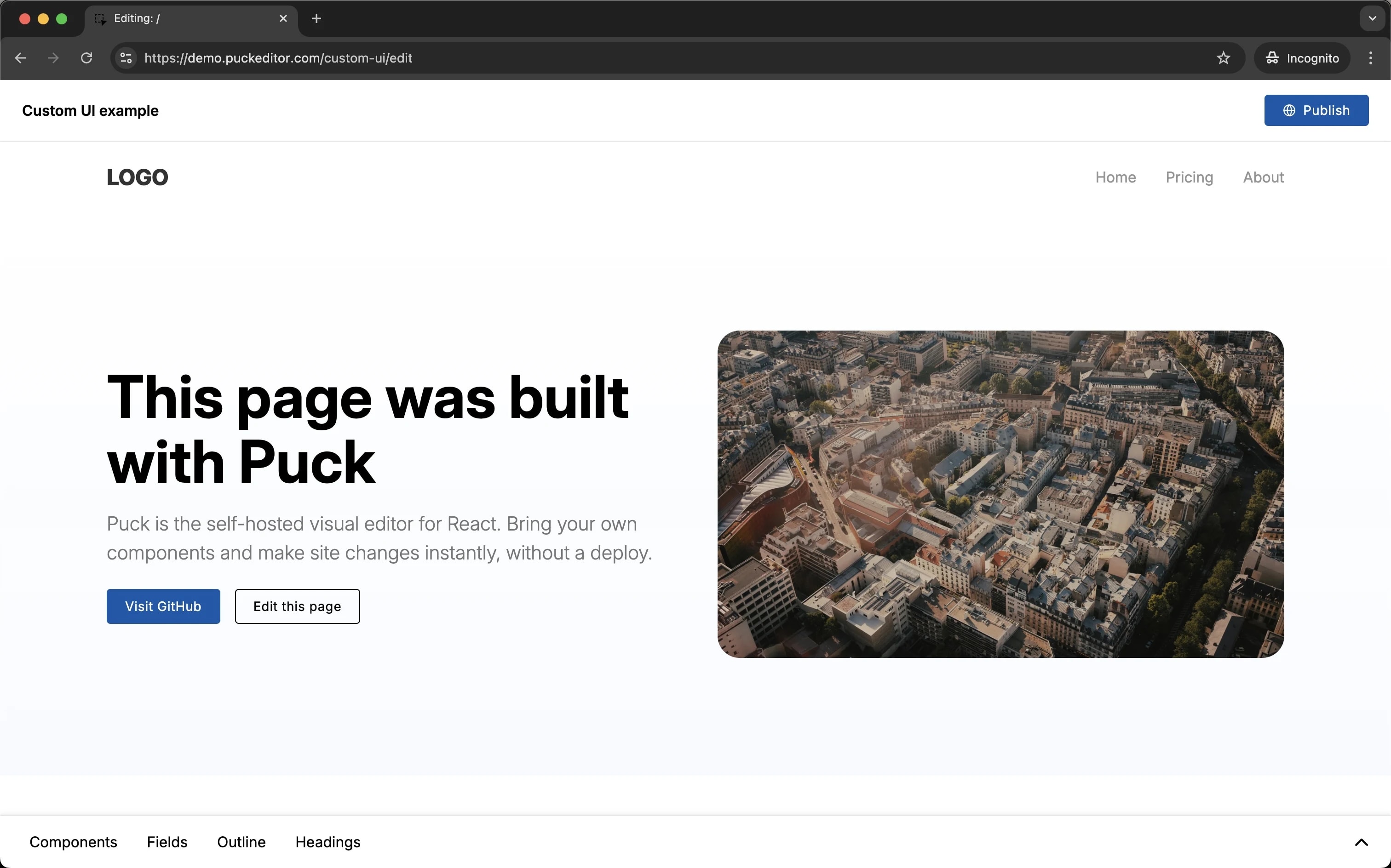Puck 0.13: Custom UIs, object fields & DropZone restrictions
Puck v0.13.0 introduces some of our most powerful APIs yet, enabling completely custom interfaces, adding support for object fields and mechanisms to restrict DropZones.
TLDR
- Custom interfaces: Take complete control of the Puck UI with the new custom interface APIs.
- Object fields: Represent objects as fields with the new
objectfield type. - DropZone restrictions: The new
allowanddisallowprops allow you to restrict which components can be dropped into DropZones. - New plugin API (Breaking Change): The plugin API has been updated to align with the new custom interfaces API. This is a breaking change. The plugin API remains experimental.
- New transformProps API: The new transformProps API makes it easier to rename props on your components without breaking your payload.
- New
uiprop: Set the initial UI state for the Puck editor on render. - Add search to external fields: Show a search input in the
externalfield modal, enabling the user to query your external API.
Highlights
🎨 Custom interfaces
It’s now possible to create completely custom Puck interfaces to integrate more deeply with your own UI and create a seamless experience for your users.

This can be achieved by passing children to the <Puck> component.
import { Puck } from "@measured/puck";
export function Editor() {
return (
<Puck>
<div style={{ background: "hotpink" }}>
<Puck.Preview />
</div>
</Puck>
);
}See this demo.
🪝 The usePuck hook
Access Puck’s internals using the usePuck hook to extend Puck’s functionality with powerful custom components.
import { Puck, usePuck } from "@measured/puck";
const JSONRenderer = () => {
const { appState } = usePuck();
return <div>{JSON.stringify(appState.data)}</div>;
};
export function Editor() {
return (
<Puck>
<JSONRenderer />
</Puck>
);
}🗃️ Object fields
Object fields enable you to represent your object types with the fields API. No more flattening your props!
const config = {
components: {
Example: {
fields: {
params: {
type: "object",
objectFields: {
title: { type: "text" },
},
},
},
render: ({ params }) => {
return <p>{params.title}</p>;
},
},
},
};🙅 DropZone restrictions
Restrict which components can be passed into a DropZone component with the allow and disallow props.
const MyComponent = () => (
<DropZone zone="my-content" allow={["HeadingBlock"]} />
);Deprecations
renderHeader deprecated
The renderHeader prop has been deprecated in favor of the overrides API.
// Before
export function Editor() {
return (
<Puck
renderHeader={({ appState, dispatch }) => ()}
/>
);
}
// After
export function Editor() {
return (
<Puck
overrides={{
header: ({ appState, dispatch }) => ()
}}
/>
);
}renderHeaderActions deprecated
The renderHeaderActions prop has been deprecated in favor of the overrides API.
// Before
export function Editor() {
return (
<Puck
renderHeaderActions={({ appState, dispatch }) => ()}
/>
);
}
// After
export function Editor() {
return (
<Puck
overrides={{
headerActions: ({ appState, dispatch }) => ()
}}
/>
);
}Breaking changes
renderComponentList removed
The renderComponentList prop has been removed in favor of the overrides API.
// Before
export function Editor() {
return (
<Puck
renderComponentList={({ appState, dispatch }) => ()}
/>
);
}
// After
export function Editor() {
return (
<Puck
overrides={{
componentList: ({ appState, dispatch }) => ()
}}
/>
);
}Plugin API revamped
The plugin API has been significantly revamped to match the overrides API.
// Before
export function Editor() {
return (
<Puck
plugins={[
{ renderFields: ({ appState, dispatch }) => () }
]}
/>
);
}
// After
export function Editor() {
return (
<Puck
plugins={[
overrides: {
form: ({ appState, dispatch }) => ()
}
]}
/>
);
}Changelog
See the GitHub release for a full changelog.
Learn more about Puck
If you’re interested in learning more about Puck, check out the demo or read the docs. If you like what you see, please give us a star on GitHub to help others find Puck too!